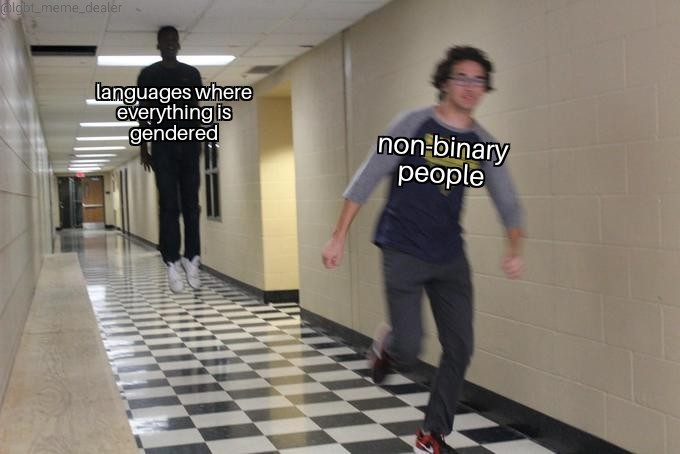traaaaaaannnnnnnnnns
Welcome to /c/traaaaaaannnnnnnnnns, an anti-capitalist meme community for transgender and gender diverse people.
-
Please follow the Hexbear Code of Conduct
-
Selfies are not permitted for the personal safety of users.
-
No personal identifying information may be posted or commented.
-
Stay on topic (trans/gender stuff).
-
Bring a trans friend!
-
Any image post that gets 200 upvotes with "banner" or "rule 6" in the title becomes the new banner.
-
Posts about dysphoria/trauma/transphobia should be NSFW tagged for community health purposes.
-
When made outside of NSFW tagged posts, comments about dysphoria/traumatic/transphobic material should be spoiler tagged.
-
Arguing in favor of transmedicalism is unacceptable. This is an inclusive and intersectional community.
-
While this is mostly a meme community, we allow most trans related posts as we grow the trans community on the fediverse.
If you need your neopronouns added to the list, please contact the site admins.
Remember to report rulebreaking posts, don't assume someone else has already done it!
Matrix Group Chat:
Suggested Matrix Client: Cinny
https://rentry.co/tracha (Includes rules and invite link)
WEBRINGS:
🏳️⚧️ Transmasculine Pride Ring 🏳️⚧️
⬅️ Left 🏳️⚧️🏳️🌈 Be Crime Do Gay Webring 🏳️⚧️🏳️🌈 Right ➡️

view the rest of the comments

I still don't understand languages that gender things, anyone able to explain why its a thing? Like what if you removed the gender from the word, would the language explode?
Remember learning French and thinking it was completely absurd
The grammar would. You could probably easily "degender" Arabic by just making everything masculine, but you would have to pick one to be the one gender, it can't be neither. But you'd also have to invent a bunch of new words, or just declare that things with "real gender" is all gender neutral in its masculine form now. Brother is sibling and we won't have a word for brother.
Similarly in most Latin languages removing the gender totally would leave open questions of how grammar works. You'd have to decide formally how to do even basic stuff like pluralize which is now done according to gender. You COULD probably just decide you're going to use one of the genders, but it would require reworking the language from the bottom up.
As far as portuguese is concerned it wouldn't just sound weird and break the grammar, it might even sound disrespectful. A lot of grammar is imposed from the top by language academies, but most of the language itself is socially constructed. So it's not like it's an easy change.
im currently learning some spanish and the gendered thing might have some kind of deep linguistic and anthropological history behind it but mostly from what i can tell it comes down to the flow of the language, like la or el before a word has more to do with how that word flows in the masculine or feminine than anything else
there are exceptions of course like to my ear "la nina" flows off the tongue so much easier than "el nino" due to the placement of consonants being mashed too close together so when learning it i kind of just learn the gender with it because im not studying grammar or word lists but rather listening to the language spoken in context so the flow is always part of it
sometimes its just super obvious like try to say "la hombre" instead of "el hombre" its just so wierd like of course the word is masculine in that flowy sort of way you dont even need to know the word is referring to a man
Look, cars are obviously male and bridges are very clearly female. It makes so much sense that people just know it!
Not really, at least in Russian it depends on the ending consonant/vowel of the noun.
For example, car in Russian is mashina, it ends with -a which means it is a feminine noun.
I think it mostly has to do with how the pronunciation flows, like moya mashina (my car, with feminine singular moya as its possessive pronoun) obviously flows better than moy mashina (with masculine singular moy).
I definitely agree it has more to do with how it sounds than anything else. Just check how people gender foreign gender neutral words, it's pretty random.
It's a historical grammatical thing. It's like a "tag" on one word that could be duplicated on another word (agreement of adjectives, verbs, etc. with a noun) so that information is not just preserved but error-corrected in case someone misspeaks or mishears.
Gender is actually a subset of class systems in general and is overblown because of bias towards Indo-European class systems which happen to be mostly along lines of gender.
Yeah I know, not really an improvement if we start calling it a class system instead of gender 😑
To answer your question, I guess a language could break down without this redundancy mechanism of class agreement. But then descendants of European languages like pidgins and creoles often just drop gender altogether and work just fine.